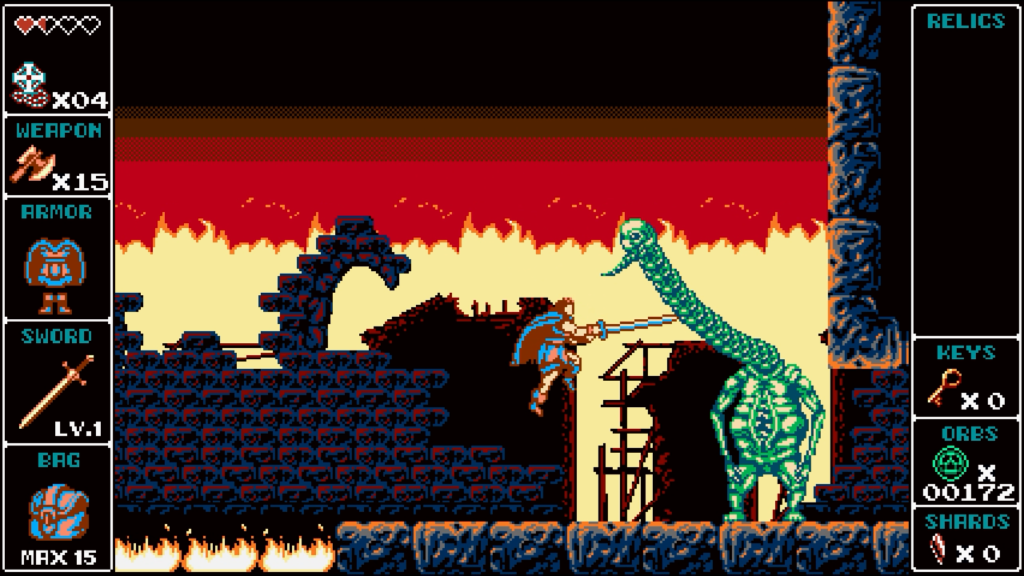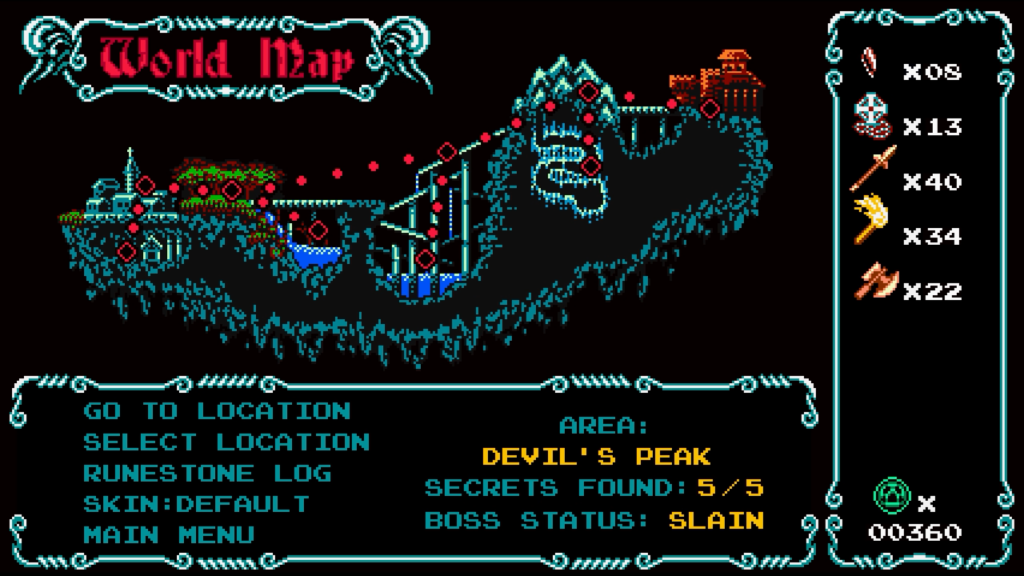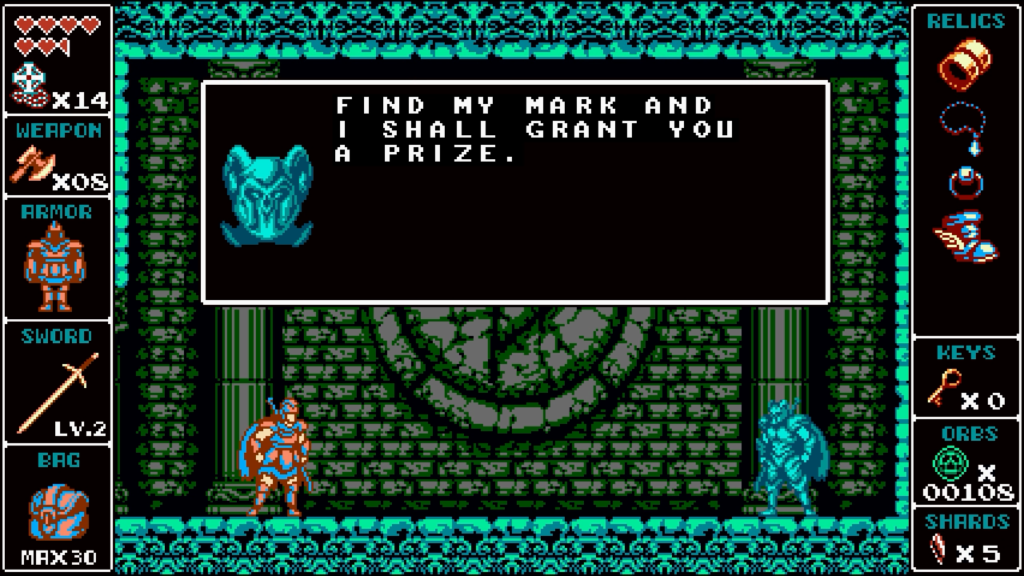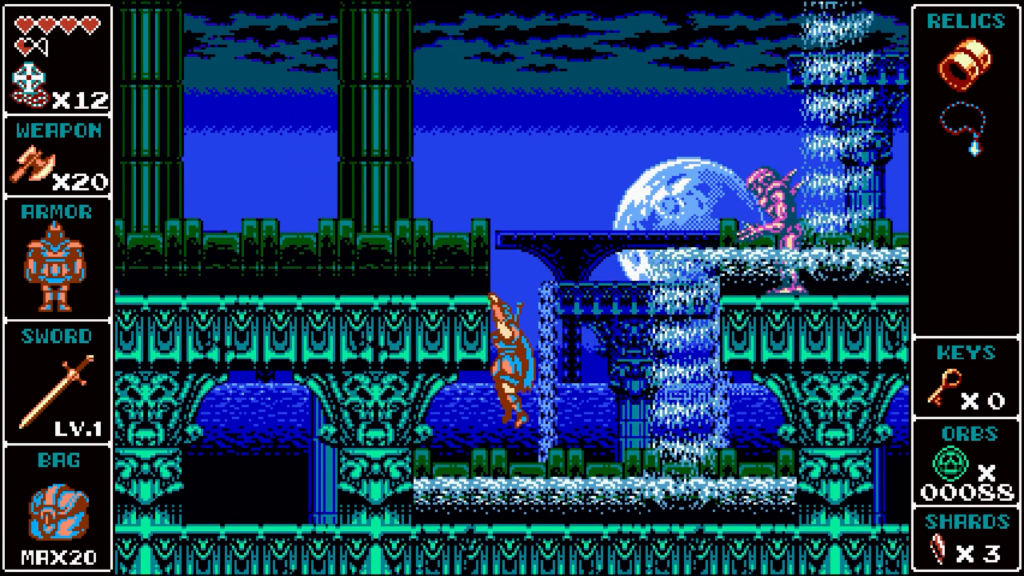I previously reviewed Oniken, a hearkening to classic 8-bit action-platformers. Brazilian indie developer Joymasher has also produced a retro platformer called Odallus: The Dark Call, but where Oniken recalls yellow peril-infused apocalyptic science-fiction, Odallus is dark fantasy to its core. Slow and oppressive yet deep and welcoming, it’s an interesting counterpoint to Oniken’s linear spectacle, tasking me with exploring and re-exploring levels to find new exits and treasures, leading to the final showdown in a ruined castle.
In Odallus, I guide a hunter named Haggis. Returning to his village one day, Haggis finds it overrun by a demonic cult led by the village elder who transforms into a warped creature with a telescoping neck. After killing the elder, Haggis finds a fragment from a magic stone and learns that his son is alive but held captive by the cult at a nearby castle. He sets out to gather the remaining stone shards, rescue his son, and put a stop to the cult once and for all.

Odallus is set in a repeatably explorable world. I select the next level I will guide Haggis through from a map depicting the countryside stretching between the village and castle. If I want to re-enter a level to uncover health-expanding heart fragments and projectile-increasing weapon bags I missed on a previous visit, I am allowed to do so. But the dotted lines between each level also reach downwards, hinting at hidden paths leading to new levels buried beneath the earth. Traversing the top of the aqueduct is easy enough but to reach its lower level requires the ability to breathe underwater, so I must revisit the aqueduct later once Haggis gains that power. Visiting these hidden levels reveals that the normal-looking surface hides a pulsating, demon-infested underworld.

Haggis begins his journey as a bare-bones action-platforming protagonist, able to jump and swing his sword. This is sufficient for beating the first few levels, but Haggis needs new abilities to traverse later levels and fully explore the earlier ones. Aside from breathing underwater, he gains classic platforming abilities like dashing, floating, and double-jumping.
Haggis uses these abilities to explore an eclectic environment. Starting in his home village, he moves out into the surrounding forests and caves, through an aqueduct providing fresh water to the village farmland, then up a mountain dotted with mines and fields of ice whose peak hides the castle. It’s never as straightforward as moving from point A to point B; levels wind back and forth, doors require hidden keys to open, other doors open when a stone weight is found and pushed onto a nearby switch. The aqueduct has a long sequence traversed by boat. The mountain mines must be negotiated by runaway minecarts.

Each level is capped by a boss fight with a demonic creature. I found these encounters forgettable; thanks to thorough exploration, my kitted-out Haggis was able to ignore boss mechanics and burn them down. This caused the three-phase final boss to be a vicious wakeup call as I suddenly couldn’t tank all the damage coming my way while mashing the attack button.
This might be Odallus’ biggest problem: It’s a solid platformer and satisfying to explore, but lacks challenge. The different levels are distinct, but their boss fights—the set pieces of Haggis’ journey—bleed together into a general mishmash of sword swinging at fleshy weak points. The emphasis of my experience was on exploration and a subtle sense of growth rather than the explosive milestones accompanied by conquering a boss. There is a harder Veteran difficulty which might provide me with a great sense of accomplishment, but it is locked behind a Normal difficulty win to access and I feel no great urge to revisit Odallus on that difficulty.

Like Oniken, Odallus tries to replicate a 1980s visual aesthetic using an ugly scan line overlay placed over its 8-bit pixel graphics. Thankfully, this overlay may be disabled. Odallus also has strobing light effects in cutscenes, though it has the decency to warn the player on bootup. Players with photosensitive epilepsy beware.
Odallus: The Dark Call recalls the low budget dark fantasy films of the 1980s and the videogames which cribbed from them. It emphasizes exploring levels and uncovering upgrades, developing Haggis from a rudimentary hunter archetype into a powerful action hero with an array of weapons and movement skills, rather than on hurtling from set piece to set piece towards the final boss. It is a slower, meditative videogame; I visited each level at least twice, a new exit uncovered on my second visit proving more momentous than smiting a terrible demon on my first. As a person who enjoys exploration and discovery, I found this satisfying. But if I was in a mood to find demons more exciting than doorways, I might find it a disappointment.